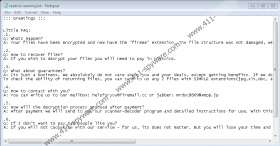Fireee Ransomware Removal Guide
Fireee Ransomware is a malicious application that shows a message urging to use this email address helpforyou@firemail.cc to contact the malware’s creators. The message also claims that the threat has encrypted all important victims' files and that they can only be restored by purchasing decryption tools from cybercriminals. In other words, the threat’s victims are asked to pay a ransom in exchange for getting their files restored. The bad news is that paying the ransom is risky because you cannot be sure that you will get the tools needed to decrypt files. Thus, users should take their time before deciding what to do if they find this malicious application on their system. It might be easier if you get to know the malware better, and you can do so by reading the rest of our article. We can also offer our removal instructions available below that may help you erase Fireee Ransomware manually.
Let us talk about how Fireee Ransomware could be spread. One of the channels that might be used to spread it is file-sharing websites. The threat could be bundled with various installers, game cracks, etc. Thus, we highly recommend keeping away from unreliable file-sharing websites, for example, sites that contain pirated software, unknown tools, game cracks, and so on. The malicious application could also be distributed through spam emails, so you should watch out for emails coming from unknown senders or received under suspicious circumstances. Especially if they contain buttons, links, or attachments. Remember that you can avoid opening malicious data unknowingly by scanning it with a reliable antimalware tool. Thus, if your computer is not protected by a legitimate antimalware tool yet, we recommend considering getting one.
Fireee Ransomware should start encrypting pictures, photos, various documents, and other files considered private soon after it sneaks in. You might notice what is going on because the malicious application should hide in the background while encrypting files. Thus, one by one, your private files should become locked and marked with the malware’s extension, e.g., receipt.pdf.[C0318185].[helpforyou@firemail.cc].fireee. After the malware ends the encryption process, it should drop files called readme-warning.txt in every folder that has encrypted files. This document should contain a ransom note. As you see, the text explains that files that got encrypted can only be decrypted with tools purchased from Fireee Ransomware’s developers. The note does not say how much a user would have to pay, but it is mentioned that the payment should be made in Bitcoins, a cryptocurrency often used for anonymity purposes. Hackers claim that they can guarantee that you will receive the promised decryption tools. The truth is that there are no guarantees because you will be asked to pay first, and there are no refunds when dealing with hackers.
Naturally, if you do not want to fund cybercriminals or risk getting tricked and losing your money for nothing, we advise closing the ransom note and erasing Fireee Ransomware. If you want to know how you could manually remove this threat, you could use the instructions at the end of this paragraph. You can also delete it with a chosen antimalware tool. Of course, we recommend getting a reputable antimalware tool if you want a reliable tool that could clean your system and keep it safe.
Get rid of Fireee Ransomware
- Tap Ctrl+Alt+Delete.
- Pick Task Manager.
- Select the Processes tab.
- Look for a process associated with the malware.
- Select the process and click End Task.
- Leave Task Manager.
- Tap Win+E.
- Go to these locations:
%TEMP%
%USERPROFILE%\Downloads
%USERPROFILE%\Desktop - Find the malicious file opened before the system got infected, right-click it, and select Delete.
- Search for files named readme-warning.txt, right-click them, and select Delete.
- Close File Explorer.
- Empty Recycle Bin.
- Restart the computer.
Fireee Ransomware Screenshots:


